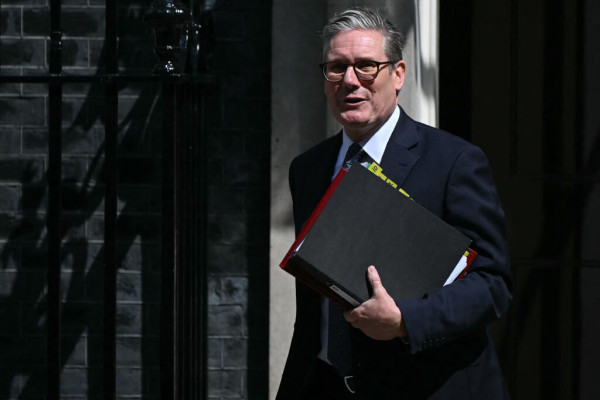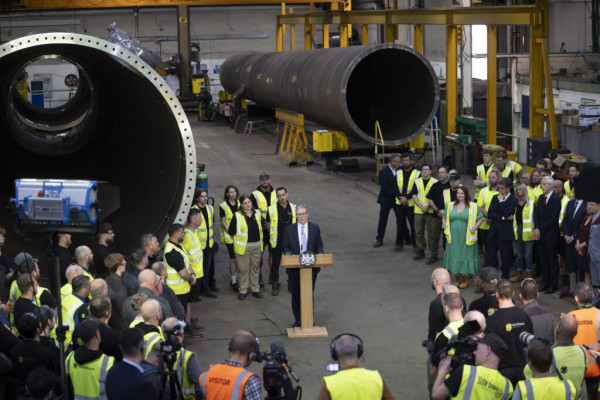Germany wants a Brexit mega deal
LONDON — Keir Starmer has said he wants a broad new security agreement with the EU. It could end up being very broad indeed.
Berlin wants to turn the British prime minister’s proposed security pact into a veritable Brexit mega deal: encompassing everything from agricultural rules to the Erasmus student exchange program.
“We very much welcome the initiative of a security pact. It’s not only security, it’s broader: so I would call it a Security and Cooperation Agreement between the U.K. and the European Union,” Germany’s ambassador to the U.K. Miguel Berger told POLITICO.
“We have a headline, which is security and cooperation. And beneath that, we think we should look for areas which are in the common interest.”
Starmer has pledged a Brexit “reset” with the EU after turbulent relations under his Conservative predecessors. The new British prime minister wants closer cooperation on security — but also tighter economic ties in areas like agriculture, chemicals, and professional qualifications.
Under Berlin’s proposal such aspirations would be bundled under a single headline of a Security and Cooperation Agreement and packaged with EU priorities like improved youth mobility. Other EU members — who would need to agree to the idea for it to go forward — might chime in with their own asks, such as improved fishing access to U.K. waters.
The name of the proposed deal suggested by the ambassador recalls the existing Trade and Cooperation Agreement (TCA) signed under Boris Johnson. EU member countries, including Germany, cringe at the thought of reopening that existing accord, put together after years of sometimes painful discussions — but are still keen to deepen cooperation with Britain’s new government. An SCA might be one way to do it.
Willingness to cooperate
Starmer has moved quickly to build ties with Germany since taking office on July 5, meeting with Chancellor Olaf Scholz three times in just 10 days — first at a NATO summit in Washington, then at the Euros final in Berlin, and again at the European Political Community (EPC) summit in Oxfordshire.
The PM has used the meetings and those with other leaders to judge EU openness to fresh Brexit talks on the new British government’s priorities. He told lawmakers in the House of Commons last week that he detected an “appetite” for negotiations.

The feeling appears to be mutual. Berger, who attended the EPC summit last week along with Scholz, said Starmer “was really able to convey this message of a reset.”
“I think that was the feeling for many of the EU heads of state and government after the meeting: that Starmer really very clearly showed this willingness to cooperate. I would say the message of reset really came through,” Berger said.
“What I can really see is that not only in Germany but I think overall in the European Union people have been very impressed with the very fast outreach by the new British government.”
Starmer is expected to meet with European Commission President Ursula von der Leyen before the end of the summer. It could be an opportunity to work out exactly what will be up for negotiation. One EU official granted anonymity to speak freely said that both sides are in touch, but that no timing is confirmed at this point.
Some misunderstanding
Berlin’s strong suggestion that a new agreement should include a section on visas for young people is likely to be controversial in Westminster.
In opposition, Starmer’s Labour party snubbed EU aspirations for talks, saying it had “no plans” and likening the proposal to freedom of movement, which it has ruled out. Starmer would not be drawn on whether he had discussed improved youth mobility with leaders at the EPC when he appeared in the Commons last week.
But Berger and other EU diplomats have been keen to stress the significant differences between EU proposals on the matter — which are about making it easier for certain people to get conditional time-limited visas — and a return to freedom of movement.
“Regrettably, there was some misunderstanding about the proposal of the EU Commission to open negotiations with the U.K. which went to the member states,” the ambassador said.
“And there was, I think, the misunderstanding that this could be interpreted like a kind of [free movement] for young people through the backdoor, which is definitely not the intention — I want to make that very clear.
“I think that's very important that people understand this has nothing to do with the migration dossier, because people come here to study, work, do internships, whatever, and then they would leave. So this is not about migration.”

Mobility remains “very important, not only to Germany but to all 27” as a component of a new Brexit settlement, he said.
“That would include a youth mobility scheme. It would include the Erasmus program, school trips, youth exchanges, the question of visa costs, which are more than 10 times higher to come to the U.K. than the other way around. So I would say there are many, many things which affect the day-to-day mobility, especially for young people, and I would really like to see some progress there.”
Views differ
The idea of broadening out an EU-U.K. security pact did not originate in Berlin: Starmer and his Foreign Secretary David Lammy earlier this year made the case for just such an approach to delegates at the Munich Security Conference. Under their proposals such a deal would have stuck to areas at least tangentially related to security, such as supply chain security, climate security, and perhaps migration.
Their idea was not welcomed by everyone in Brussels. Speaking after the event, one EU diplomat, who was granted anonymity to speak candidly, politely declined. “We’re not sure we see it the same way,” they told POLITICO, adding their country was open to a security deal but was “more comfortable with the classic definition of ‘security.’”
Figures close to French President Emmanuel Macron have also voiced skepticism at the need for a new agreement.
Nathalie Loiseau, a senior French MEP who was France’s Europe minister during Brexit talks, told a meeting of the European Parliament’s foreign affairs committee in March: “While I regret that the TCA does not contain a cooperation framework in the field of foreign and security policy, we need to be pragmatic … and focus on those areas where we can formalize our existing cooperation within those existing structures.”
But Berlin’s proposals differ in one significant respect: they would turn a new agreement into a vehicle to address not just British priorities, but EU ones too. It might make wavering capitals think again.
Barbara Moens contributed reporting from Brussels.